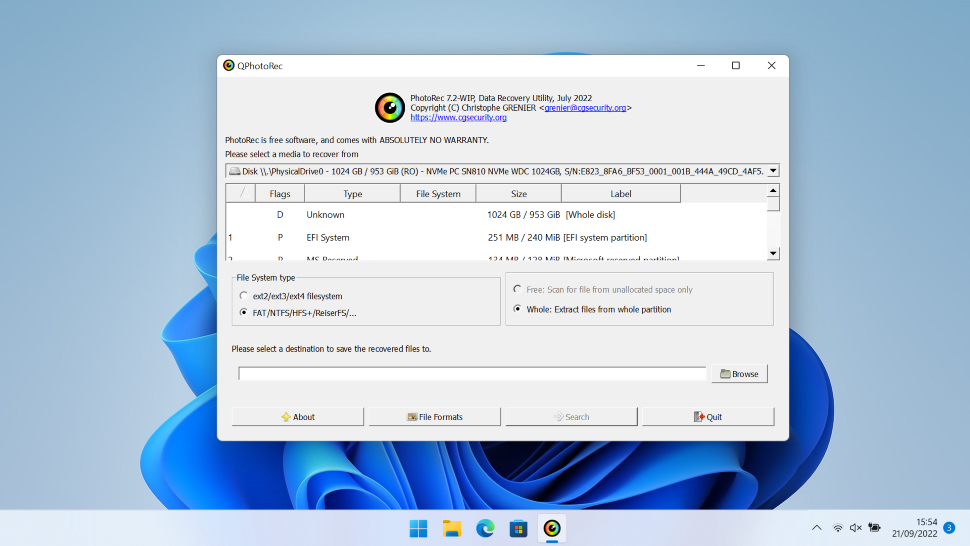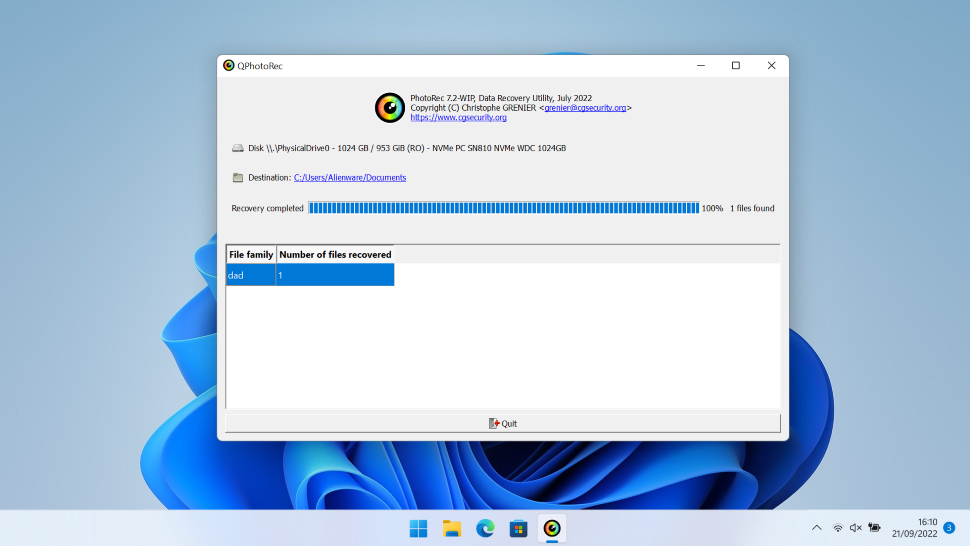TechRadar Verdict
It’s free, open-source, fast and supports lots of photo formats and devices, but PhotoRec is not particularly easy to use and doesn’t have many extra features.
Pros
- +
Free
- +
Effective, fast scanning
- +
Broad device and format support
Cons
- -
Tricky for beginners
- -
No extra features
- -
Poor support
Why you can trust TechRadar
Most of the best photo recovery apps are enterprise-focused, so you’ve got to buy to use properly, but PhotoRec is an open-source alternative that combines its free price with solid features.
Its open-source status doesn’t just mean that it’s free, either. That designation means that people can view, access and contribute to the app’s development.
You’d be remiss to look down on this app because of its free stature. In many key areas, the data recovery software features mirror or even exceed the abilities you’ll find in premium products.
PhotoRec: Plans & pricing
- It’s free - when it comes to affordability, you can’t say fairer than that
This is an open source app, so it’s free to use – just like TestDisk. Indeed, if you download one, you’ll get the other included in the package. And don’t expect any different plans available elsewhere, as this is one product with one set of features.
If you do use PhotoRec for restoring your photos and you’d like to contribute to the developer, there’s a PayPal button for donations on the website.
- Plans & pricing: 5/5
PhotoRec: Features
- A very basic range of features, albeit with decent file format support
There’s no getting around a particular elephant in the room when it comes to PhotoRec: this is not a good-looking or modern application. Load this tool and you’ll be greeted by an interface that looks like it should be at home on an older version of Windows. Almost every free and paid photo recovery app looks sleeker and more sophisticated.
Don’t judge PhotoRec by its interface, though – and concentrate on the features instead. This app can recover files from nearly 500 different formats, which is a broader range of support than some paid products offer. If you drill down towards photography, you’ll find recovery capability for every mainstream imaging file, RAW files, and files from big imaging businesses like Adobe, Olympus, Apple, Nikon and Canon.
Sign up to the TechRadar Pro newsletter to get all the top news, opinion, features and guidance your business needs to succeed!
If you’re unsure whether PhotoRec can find your lost photography, there’s an online analysis tool that will tell you if this app can find the media – head here to upload another file with the same format and give it a try.
That’s a solid start, and PhotoRec impresses elsewhere. It works with hard disks, SSDs, storage cards, flash drives and optical media, and works with lots of popular digital cameras. It works with all major Windows and Apple file systems, too, and even popular Linux file systems. And, as it’s open source, you can even download and compile the source code yourself if your system of choice isn’t officially supported.

The interface might not look like much, but it’s relatively easy to use for anyone with tech experience. Load the photo recovery software and you’ll see a list of potential drives and devices, and you’ve got to choose a destination folder for any restored pictures. The scan dialogue will be familiar to anyone who ran defragmentation tools on older versions of Windows, and as the scan runs you’re given a list of what files have been found and restored.
The app does lose out thanks to its interface design, though. The initial list of drives includes all partitions, which could prove tricky for people who aren’t tech-savvy, and most other apps don’t require users to specify folders to store recovered photos. Don’t expect much in the way of customer support, either – there’s a forum and an FAQ, but that’s it. That’s tricky enough for home users and precludes PhotoRec from finding a home in a business environment.
Scanning is reasonably fast, but there’s little help when the scan finishes. You can click a link in the app to open the folder you chose or navigate to it yourself, but you’re just given a directory of all of the recovered media. You’ll have to browse through that yourself – you don’t get the search or filtering options usually available elsewhere.
Also bear in mind that PhotoRec doesn’t have many other features that you may take for granted in paid apps or more modern free software. It doesn’t have the high-end RAID or NAS abilities found elsewhere, for instance, and it won’t attempt repairs on pictures and videos. And, unlike many other software companies, PhotoRec isn’t available in bundles with loads of other PC utilities.
Indeed, the only other product made by CG Security is TestDisk. It comes bundled with PhotoRec, and it’s a utility for recovering and fixing hard disks and partitions. It’s certainly useful, although it only works using a command line interface and is therefore only suitable for people with plenty of tech experience – if that’s not you, it’s intimidating and incomprehensible.
- Features: 2/5
PhotoRec: Final verdict
There are plenty of positives to take from PhotoRec. It delivers fast and effective photo recovery in a straightforward interface for anyone with reasonable tech knowledge. Its open source nature means that it’s free – and a great option if you want to support that alternative method of software production and distribution. It works with loads of file types, devices and storage systems, so it’s extremely versatile.
The design ensures that PhotoRec is only suitable for people who consider themselves tech-savvy, though, and elsewhere this app doesn’t have the abilities you’ll find in other tools – or the ease of use.
PhotoRec is a good image restoration tool for tech-savvy people who want to support the open source movement or recover pictures from more obscure systems and devices, but beginners and people who need powerful extra features should look elsewhere.
PhotoRec: Scorecard
| Row 0 - Cell 0 | Row 0 - Cell 1 | Row 0 - Cell 2 |
| Plans & pricing | Free and open-source, no cost | 5 |
| Features | Basic tools on offer | 2 |
| Overall | Fast, effective, and free - but limited features | 3 |
Should I try?

Try it if...
You want a fast and free photo recovery app
PhotoRec's performance is great, and with the (admittedly free) admission price alone. Tech-savvy users looking to support open-source software alternatives will be especially pleased.
Don't try it if...
You need fully featured, easy-to-use photo restoration software
To get the most out of PhotoRec, it's best to familiarize yourself with the frankly spartan tools on offer. It's not particularly intuitive for beginners and it lacks advanced features for professionals. A mixed-bag.
Mike has worked as a technology journalist for more than a decade and has written for most of the UK’s big technology titles alongside numerous global outlets. He loves PCs, laptops and any new hardware, and covers everything from the latest business trends to high-end gaming gear.
